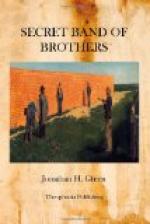The papers were sent for, as before stated, and all their designs, of a public and private nature, set in active operation. Of this the colonel had no knowledge at the time. Mrs. B. was to give them up to the committee appointed for the purpose of inspecting them. All that would have any tendency to injure or expose the fraternity, if brought to light, were to be selected, and the rest brought forward for the purpose of convicting Taylor. The intention of bringing these papers to the city being, in the mean time, made known to the colonel, he gave directions to his sister-in-law to reserve such papers as he specified, and hand the balance over to the committee. The trunk in which they were deposited having arrived, Mrs. B. acted according to directions, reserving the notable package which she concealed between her beds, while she conveyed the residue to the prison office for legal purposes—to be used by the committee, who met there by consent of one of the prison keepers—he being a Grand Master of the secret band and one of the principal policemen. After delivering up the papers, she returned and found her valuable deposit had been removed as previously stated.
The fact of their removal being made known to the brotherhood, they thought some base person had robbed the lady of her important charge. This opinion prevailed with the fraternity generally. Not so with the two hundred grandees. Their opinion assumed the character of their former suspicions, while their suspicions were converted into fact. They were now fully convinced that the colonel contemplated the destruction of their order, and was intent upon keeping the papers in his own power: that he had even entered upon the act of defeating the very purpose they had in view, in bringing those papers to the city. At this time the city was crowded with the members of this secret society, and private rewards were offered by the two hundred or that portion of this band then in the city, for the recovery of the papers. These rewards made a great stir, especially with the officers of all parties, both those for and against the colonel. Taylor was a mark to be shot at by about seven-eighths of the




